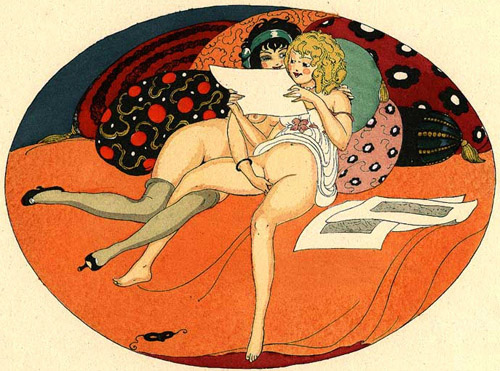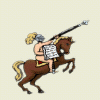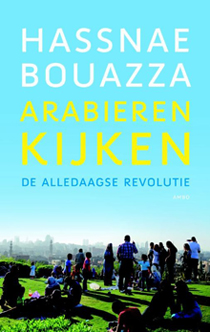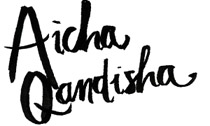Hilary Mantel Interview: Guardian Angel
Peter Breedveld

Illustratie: Gerda Wegener
Vorig jaar kreeg mijn favoriete levende schrijver Hilary Mantel de Booker Prize voor haar historische roman Wolf Hall. Vlak daarvoor was het me eindelijk gelukt een interview, dat ik anderhalf jaar eerder met haar had gehad, aan Vrij Nederland te slijten. Hieronder het eerste deel van de transcriptie daarvan, over de paranormale dimensie van het schrijven.
In your autobiography you write about seeing things that are not there. Ambiguity: things you see could be because of your illness.
“When I was writing my memoir I was writing about migraine and the very strange side effects that had, and sometimes the medicine that I took because of the other illness made my migraine worse. Before Oliver Sachs was famous he wrote a wonderful book about migraine and it saved my sanity because it showed me how strange and varied the effects could be and no, I wasn’t going mad, it was just the migraine and it would pass. The whole thing got a kind of metaphorical dimension in a way because one of the things I experienced was the sense of a presence of someone being always on my left hand side whom I couldn’t quite see. My husband said: ‘Maybe this is where the idea of a guardian angel came from.’ Which I thought was a nice idea, really.”
“There were other strange experiences, wholes in the world, patterns of light and so on. But the sense of a presence seemed to me to have a metaphysical dimension. And of course for a writer there is always someone there, your characters, the people in your book, whether invented by you or who just happened to be dead, they’re always there and a writer spends a lot of his time talking to people who are invisible to the rest of the world. So it’s a very strange trait in that way. You take this process for granted, that you have this lively reality inside your head. And sometimes the rest of the world seems quite grey and nebulous in comparison. What’s going on in your head seems to be in Technicolor.”
Do you still see things that aren’t there?
“Not so much, because I have the condition under control. But one has to put ‘see’ between inverted commas, because I never hallucinated. Once you’ve had the experience of a presence, you don’t forget what it’s like, you don’t forget the texture of it. And of course in my daily work it’s my job seeing things.that aren’t there, or hearing voices. Some books arrive very visually, like the book I am currently writing. Other books, like The Giant, O’Brien, seemed to consist just of voices. And when I sat down to write, my job was to listen to this voice.”
“Of course when I talk about it like that, it sounds like a very mystical process, But so much of writing is just plain hard work, just hard graft. A lot of planning and structuring. A lot of sheer intellectual grind. But there is an aspect, which is maybe only five percent of the total, which is like a visionary or auditory experience. Of course that is the bit that matters. In a way you’re always searching for these experiences. But I don’t want to put too much stress on it, because I’ve had people trying to persuade me into saying that I actually hear voices and that I see my characters, but I don’t. Not in the way that I see you. I wouldn’t want to sound insane.”
It doesn’t sound insane. It sounds similar to what psychic people claim to see or feel or hear.
“If I hadn’t been lucky enough to have a good education, then I think I might have become very much like my character Allison in Beyond Black, because of my experiences as a child. I think I might have become the prey of the irrational. But then, if you have an education you have something to offset. You have a reasoning process to offset against this experience. So you can say it’s just a metaphor, just something I use. It doesn’t dominate my whole life. The problem for Allison is that her talent is undisciplined. She can’t stop the dead talking to her.”
“I think there are quite narrow lines between being an artist and being psychic and being insane. But these are very important lines and it’s a question of control. I am not one of these people who say that your characters take over. Because they don’t. That’s not straight thinking, when people say that. What does happen when you’re working on a book, you’re working on it unconsciously, the whole time. And something erupts into consciousness and it seems as if it comes from nowhere, as if you snatched it out of the air. But really you’ve been brooding on it, dreaming about it. It’s not an inexplicable process. But of course, sometimes it feels like a gift, like inspiration. I think your task as a writer is to try to be the kind of person that is not afraid of these processes, to give them access, allow them to come out into the outside world. It’s difficult for me, because I’m a quite controlled, logical thinker. In order to become a writer at all, I had to go against my instincts.”
About Allison, the main protagonist in Beyond Black, the things she experiences, She looks into the afterlife…
“She thinks of it as a place beyond black, she talks about earth side and their side as if she were in an airport.”
Are these your own experiences?
“No.”
Are they based on other people’s experiences?
“I went to see various mediums working, as described in the book, with big audiences. But I didn’t question anyone, or follow them around. I just sat in the audience. A lot of the things they say is just nonsense. Other times it takes with someone in the audience. Most of the times that’s good psychology, being able to read a crowd. I know about this, I do a lot of talking to audiences. I do it myself. You know, you go on stage and you think: ‘That person looks a bit mad, I won’t make eye-contact’; ‘There’s a friendly face, I’ll talk to her’. You also get sensitive to an audience’s response. They need not make a sound, but you get used to reading people’s faces. So I have experienced some of it in that way. But I think most of what these psychics do, is accounted for by them being very observant, being good psychologists, and being able to elicit information from their audiences. There’s maybe a tiny little bit that you can’t explain so easily.”
“But in the book I didn’t want to look at the question of whether Alisson is a fraud or not. I wanted to get what her world would be like, so I just imagined that. I didn’t want to write a satire about professional psychics, because they’re an easy target. It wouldn’t be fun. I was more concerned with what it would be like when such a person comes off stage and goes home. This question of personae. What lies behind it. Allison is so good at projecting herself, that you would never guess what a seething mess of dysfunction she is inside. And of course all the way along I’m making parallels between Alisson and an artist. Because I think that what psychics do is a kind of art. People try to examine it scientifically, but perhaps it isn’t capable of being understood that way. It’s a kind of healing art, the mystical branch of medicine, perhaps.”
“So that was my concern, to imagine her inner life. But actually I started the book, and halfway through I stopped to write my memoir, Giving up the Ghost, because it occurred to me while I was writing that I wasn’t quite getting there with Alisson’s childhood and that there were things in my own childhood that I needed to explore. Having done that, I went back to Beyond Black, and it was all deeper and more horrible. It took us into territory that I hadn’t thought of. Not that the events of my childhood were like Allison’s, But the feel of it was somehow like that, the texture of the experience. So writing my memoir provided the service to the novel.”
Next episode: Hilary Mantel on God, the Devil and the evil that people do.
boeken, English, Peter Breedveld, 13.03.2010 @ 10:06
2 Reacties
op 14 03 2010 at 10:12 schreef leo schmit:
Peter, Paranormaal is dat hetzelfde als het hebben van een sterk inlevingsvermogen in de personages of hoofdpersoon en, in het geval van Wolf House, de entourage rond Anna Bolleyn en Henk No. 8, dames competitie, etc?
Wat blijft er daarna nog van over, zou ik de schrijver Mantel gevraagd hebben. Leegte? Als ik iets schrijf leef ik me sterk in, maar zodra het over is vind ik het maar niks en als ik het 10 jaar later bekijk sta ik stomverbaasd en herken ik mijzelf bijna niet meer.
Dat geldt ook voor de oersaaie rapporten die ik schrijf en die vaak niet in dank worden afgenomen omdat ze nog niet saai genoeg zijn en soms toch nog een sluier van de werkelijkheid doen opwaaien (met dank aan Oek). Dat kan betaling in de weg staan. Maar als je die rapporten over tien jaar tegen zou komen, zal blijken dat het allemaal niet geheel bezijden de waarheid was. Nu ik dit zeg, vraag ik me af of EU archieven eigenlijk wel publiek toegankelijk zijn. Hoe zit het eigenlijk met het recht op EU informatie?
Nu heb ik even last van ’n schrijversblok om de Afghaanse waarheid te vertellen, maar dat rapport moet nog af en ik heb nog drie dagen. Ach, het was allemaal zo spannend daar en nu weer zover weg.
In afwachting van de paranormale inspiratie ging ik vanmiddag naar de Peunugang markt in Kota Banda Aceh, zodat ik de komende twee maanden mijn eigen potje kan koken, wachtend op mijn ‘Guardian Angel’.
Doet me denken aan een verhaal van Somerset Maugham die ergens in toenmalig Tonkin (Frans IndoChina) een stumper tegenkwam op de veranda van een terras met een relaas over zijn vele tropenjaren in China en zijn terugkeer naar Albion, waar alles tegenviel en daar zat hij halfweg weg te teren.
Somerset Maugham was ook een flinke fantast, dus ook paranormaal bevlogen?
Wanneer overkomt mij dat nou eens?
op 14 03 2010 at 11:11 schreef Peter:
Leo, de creativiteit van een mens heeft haar oorsprong in de rechterkant van het brein. Daar huist het onderbewuste, het irrationele, de poëzie, de godsvrucht. Met de linkerkant van het brein, maken we er iets begrijpelijks van. Vroeger, tot een jaar of drieduizend geleden, was er nog niet zo’n strikte scheiding tussen de twee hersenhelften. Toen hadden mensen visioenen, spraken ze met de goden, die in werkelijkheid manifestaties van de rechterhersenhelft waren, die de linker instrueerde hoe te handelen (bijvoorbeeld: ‘Ga naar die-en-die plek en offer je eerstgeboren zoon om te laten zien hoeveel je van Mij houdt’).
Tegenwoordig zie je dat nog bij schizofrenen. Hilary Mantel heeft last van migraine, die haar ‘paranormale ervaringen’ veroorzaakt. Het mooie daarvan is, is dat hier het creatieve proces van een kunstenaar een beetje inzichtelijk lijkt te worden gemaakt. De dichter die wordt geïnspireerd door de muze. Die ‘inspiratie’ komt gewoon van binnenuit.
Voor Wolf Hall en voor haar andere historische romans heeft Mantel overigens gewoon een enorme berg aan onderzoek gedaan.
Wat de theorie over de geschiedenis van het brein betreft, kan ik het boek The Origin of Consciousness in the Breakdown of the Bicameral Mind van Julian Jaynes niet hartstochtelijk genoeg aanbevelen. Het is één van mijn favoriete boeken aller tijden, samen met From Hell, waarin Alan Moore de psyche van Jack the Ripper analyseert aan de hand van onder andere Jaynes’ theorie.







 RSS
RSS